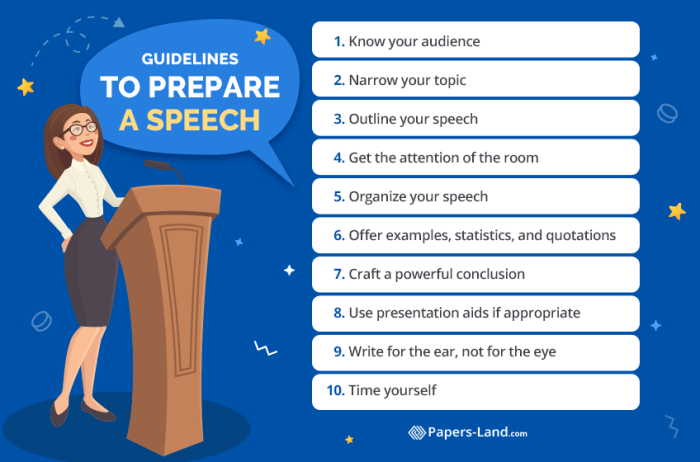Most speech instructors prepare students for speeches by emphasizing fundamental principles, providing preparation techniques, and fostering delivery and presentation skills. This comprehensive approach ensures that students develop the knowledge, skills, and confidence necessary to deliver impactful speeches.
Effective speech instruction involves tailoring methods to individual student needs, fostering a positive learning environment, and providing constructive feedback. By employing these strategies, speech instructors empower students to become effective communicators.
Teaching Fundamentals: Most Speech Instructors Prepare Students For Speeches By
Effective speech instruction begins with a solid understanding of the core principles of effective speaking. These principles include:
- Clear and concise communication
- Effective organization and structure
- Engaging and persuasive delivery
Common Teaching Methods
Speech instructors employ various teaching methods to help students develop these skills. Some common methods include:
- Lectures and discussions
- Individual and group speech practice
- Feedback and critique
Tailoring to Individual Needs, Most speech instructors prepare students for speeches by
Effective speech instruction recognizes the unique needs of each student. Instructors tailor their teaching to accommodate different learning styles, skill levels, and areas of improvement.
Speech Preparation Techniques

Strong speech preparation is crucial for effective delivery. Speech instructors share strategies to help students develop compelling speeches:
Developing Strong Speeches
- Conduct thorough research
- Craft a clear and engaging thesis statement
- Structure the speech logically and coherently
Research and Evidence-Gathering Skills
Instructors guide students in refining their research skills to gather credible and relevant evidence:
- Identify reliable sources
- Evaluate and analyze information
- Cite sources accurately
Crafting Engaging and Persuasive Speeches
Students learn techniques to captivate their audience and deliver persuasive speeches:
- Use vivid language and storytelling
- Incorporate humor and personal anecdotes
- Address potential objections and counterarguments
Delivery and Presentation Skills

Effective delivery is essential for conveying the intended message. Instructors provide guidance on developing:
Vocal Delivery
- Appropriate volume and pace
- Effective intonation and modulation
- Clear articulation and pronunciation
Body Language and Stage Presence
Students learn to use body language to enhance their presentations:
- Maintain eye contact
- Use gestures and movement effectively
- Project confidence and poise
Visual Aids and Multimedia
Instructors discuss the use of visual aids to support and enhance speeches:
- Selecting appropriate visuals
- Incorporating visuals seamlessly
- Using multimedia effectively
Feedback and Assessment

Constructive feedback is essential for student growth and improvement:
Effective Feedback Methods
- Provide specific and timely feedback
- Focus on both strengths and areas for improvement
- Offer suggestions and guidance
Clear Grading Criteria
Instructors establish clear grading criteria to ensure fair and objective assessment:
- Define specific evaluation criteria
- Communicate expectations clearly
- Provide rubrics or grading scales
Using Assessment to Track Progress
Assessment serves as a tool to monitor student progress and inform instruction:
- Use assessments to identify areas of growth
- Adjust teaching strategies based on assessment results
- Provide ongoing support and guidance
Classroom Management and Engagement

A positive and supportive classroom environment fosters student learning:
Creating a Positive Environment
- Establish clear rules and expectations
- Foster respect and collaboration
- Provide opportunities for student input
Managing Student Behavior
Instructors implement strategies to manage student behavior effectively:
- Address disruptive behavior promptly
- Establish consequences for inappropriate behavior
- Create a fair and consistent discipline system
Fostering Active Participation
Active student participation enhances learning and engagement:
- Incorporate interactive activities
- Encourage student discussion and questions
- Provide opportunities for student leadership
Using Technology to Enhance Engagement
Technology can be leveraged to enhance student engagement and collaboration:
- Use online platforms for discussions and assignments
- Incorporate multimedia and interactive tools
- Foster virtual collaboration among students
Commonly Asked Questions
What are the core principles of effective speech?
Effective speech involves clear organization, strong supporting evidence, engaging delivery, and effective use of language.
How do speech instructors help students develop strong speeches?
Instructors provide strategies for research, evidence gathering, and crafting persuasive arguments.
What techniques are used to improve students’ delivery and presentation skills?
Instructors focus on vocal delivery, body language, stage presence, and the use of visual aids.